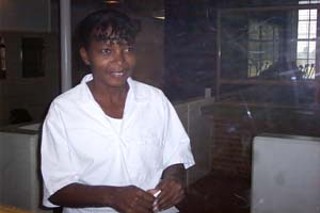Newton Executed: No Relief
On Wednesday, Frances Newton became the first black woman to be executed in the state since the Civil War
By Jordan Smith, Fri., Sept. 16, 2005

On Wednesday, Frances Newton became the third woman to die in Texas' death chamber since executions resumed in 1982, and the first black woman to be executed in the state since the Civil War. She was executed despite considerable evidence of prosecutorial negligence, inadequate defense, and recent documentation of evidence lost or suppressed during the original prosecution. On Wednesday afternoon, the U.S. Supreme Court rejected Newton's final appeal (unanimously and without comment.)
On Monday, the Texas Board of Pardons and Paroles voted 7-0 to deny clemency to Newton, who was convicted of the 1987 murder of her husband and two young children. The board's refusal was echoed by the Texas Court of Criminal Appeals, the federal district court for the Southern District of Texas, and the 5th U.S. Circuit Court of Appeals. The string of refusals – and most significantly the denial of clemency by the BPP, whose authority is not limited by any rigidly defined statutory scheme – was astounding considering the gravity of new evidence that Newton's attorneys proffered in recent weeks, which appears to support the long-standing suspicion that Houston sheriff's investigators recovered multiple firearms in connection with the April 1987 triple murder – despite prosecutorial insistence that a single weapon was seized during the investigation.
On Aug. 25, Newton's attorney David Dow, director of the Texas Innocence Network at the University of Houston Law Center, filed an addendum to Newton's clemency petition citing investigators' assertions that at least two identical .25-caliber Raven Arms guns had been recovered in connection with the crime. Although this specific information had never before been corroborated, the CCA denied Newton's final appeal based on its opinion that the recent revelations were somehow old news. The BPP's denial is perhaps the most astounding, because the board voted to recommend (and Gov. Rick Perry granted) Newton a 120-day reprieve in December in order to allow time for further testing of suspect evidence used against her at trial.
But rather than put to rest doubts about Newton's guilt, the resumed investigation actually generated additional, critical questions about the conduct of investigators and prosecutors, leading many legal observers to conclude that the board would again agree she should not be killed while a storm cloud of doubt still threatened the case. Apparently those who thought the board had the capacity for clear and compassionate reasoning were wrong. (For more on the case, see "Without Evidence: Executing Frances Newton," Sept. 9.)
Got something to say on the subject? Send a letter to the editor.








